| Srl | Item |
| 1 |
ID:
100392
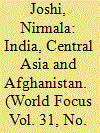

|
|
|
| 2 |
ID:
168992
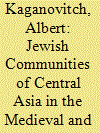

|
|
|
|
|
| Summary/Abstract |
When the Jews first settled in Central Asia is uncertain, but circumstantial evidence clearly indicates that this happened at least two and a half thousand years ago. In the first millennium AD, the Jews lived only in cities no farther than 750 km east of the Caspian sea (in the eighth–eleventh centuries the sea was called Khazarian). Only later did they migrate to the central part of the region, to cities like Samarkand and Bukhara. It is possible that Jews from Khazaria joined them, since they already had tight trade connections with Central Asia and China. There is no trace of evidence regarding the existence of Jews in the entirety of Central Asia in the early sixteenth century. At the very end of the sixteenth century Bukhara became the new ethnoreligious center of the Jews in that region. In the first half of the nineteenth century, thanks to European travelers visiting Central Asia at that time, the term “Bukharan Jews” was assigned to this sub-ethnic Jewish group. Drawing on a wide range of primary and secondary source materials, this article aims to prove that the presence of Jews in Central Asia was not continuous, and therefore the modern Bukharan Jews are not descendants of the first Jewish settlers there. It also attempts to determine where Central Asia’s first Jewish population disappeared to.
|
|
|
|
|
|
|
|
|
|
|
|
|
|
|
|
| 3 |
ID:
109162
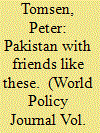

|
|
|
| 4 |
ID:
131407
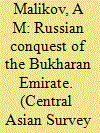

|
|
|
|
|
| Publication |
2014.
|
| Summary/Abstract |
This article examines the history of Russian conquest of Bukhara, with special reference to military and diplomatic aspects. From the beginning of the Russian advance into the region, relations between Russia and Bukhara had several peculiarities, but were characterized above all by mutual incomprehension. In my view, the main obstacle to the development of relations lay in the different understandings the two sides had of the nature of a peace agreement or treaty. In this paper I try to shed light on some questions arising from the military conflict between the Emirate of Bukhara and Russia in the interpretations of Russian military historians and Bukharan chronicles of the period. The focus is on a comparative analysis of the military capabilities of the Bukharan Emirate and Russia, the differences in weapons technology between these two powers, the links between the Russian advance in the region and the domestic and foreign policy of the Bukharan emir, Muzaffar, the situation in the emirate, and the use of Islamic ideology as a mobilizing force for the population in opposition to Russian expansion.
|
|
|
|
|
|
|
|
|
|
|
|
|
|
|
|
| 5 |
ID:
131411
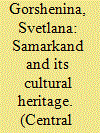

|
|
|
|
|
| Publication |
2014.
|
| Summary/Abstract |
This article is concerned with the creation, by the Russian colonial administration, Russian researchers and photographers/artists, of a corpus of 'historical monuments' of Samarkand in the first decades after the conquest of the city. It uses travelogues, administrative reports, memoirs, the periodical press and artistic productions to determine the mechanism of selection of representative monuments, defined as the 'cultural heritage' of Russian Turkestan and, indirectly, of the Russian Empire. The internal logic of 'patrimonialization', initiated from above and ideologically engaged, becomes more obvious when it is juxtaposed against native understandings of the significance of monuments, European practices, and the political projects of the Russian Empire.
|
|
|
|
|
|
|
|
|
|
|
|
|
|
|
|
| 6 |
ID:
128546


|
|
|